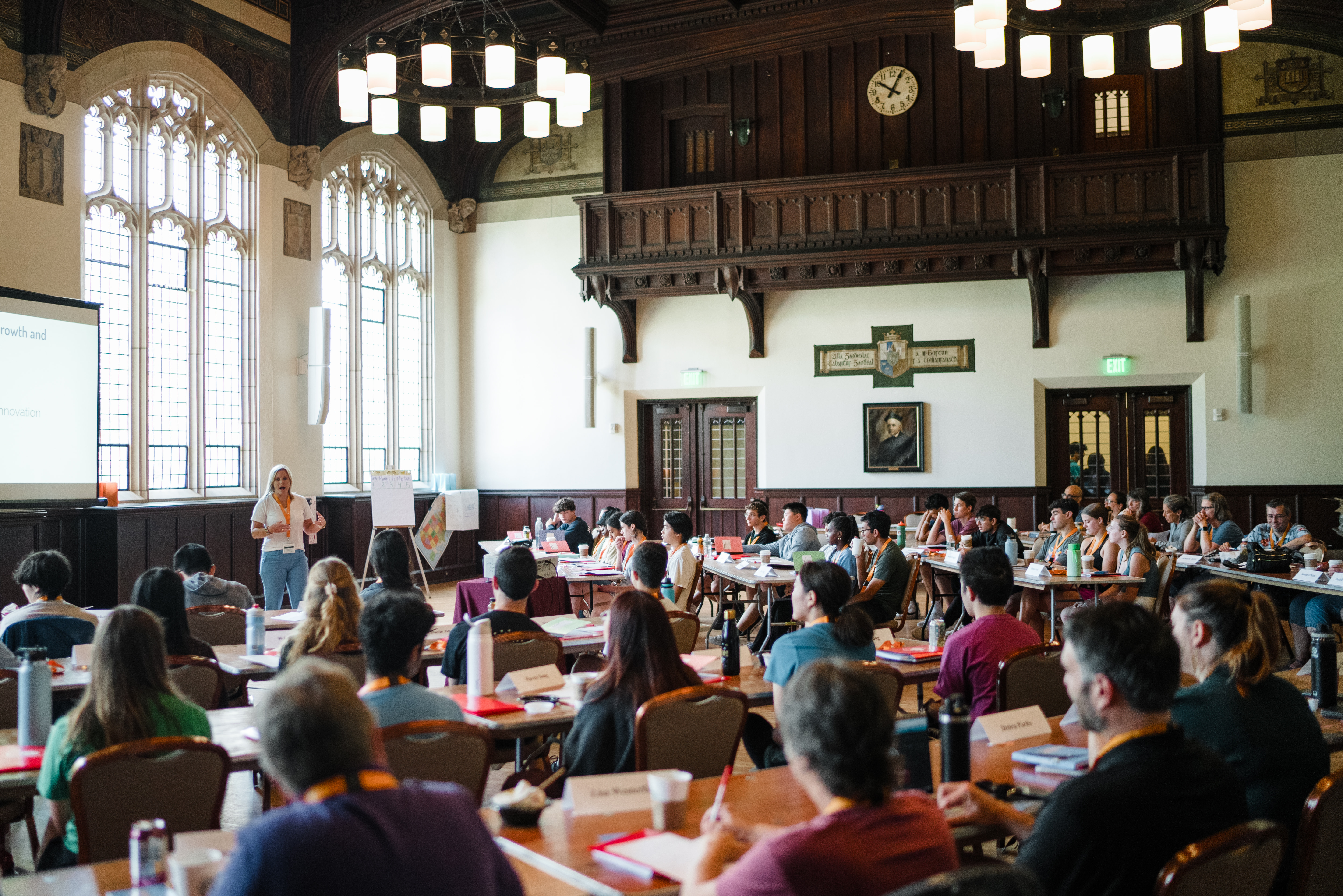The Ultimatum Game: Appendix 1
- >
- Teachers
- >
- Teacher Resources
- >
- Lesson Plans
- >
- Is Capitalism Good for the Poor?
- >
- The Ultimatum Game: Appendix 1…
Teacher Background to Game Theory and Experimental Economics
The Ultimatum Game: Using Game Theory to Study Self-Interest
In the simplest form of the ultimatum game, a proposer decides how much of $10 to give a responder, and the responder decides whether to accept or reject the offer. If the responder accepts, the players split the money in the way the proposer suggested. If the responder rejects, neither player gets any money. The experimental subjects participate in the experiment only once, and they know that they will not play again.
Ultimatum game experimenters began with the assumption that the pursuit of self-interest means participants will focus on improving their material well-being. They hypothesized that both proposers and responders would play the ultimatum game to maximize their material gains. The outcome of repeated ultimatum games and of variations of ultimatum games defied expectations, initiating an ongoing re-examination of the characteristics of self-interest.
“[T]he ultimatum game involves the question of basic human motivation. Economic theory is predicated on the notion that individuals pursue self-interest.. . .
“…[For many] who make normative judgments on policy matters, self-interest means consuming goods and leisure. . . .
“The ultimatum game results . . . suggest that human motivations are more subtle than is assumed by this . . . commonly used definition of economic self-interest. In a variety of settings, people show deep concern for the impact of their actions on others. Sometimes people act . . . to help others, but they also show a spiteful willingness to damage others” (Burnham 239-40).
Game theory helps us to understand the players’ thinking. The proposer knows that the outcome of the game depends not only on his actions, but also on those of the responder, so his offer takes into account his predictions of how the responder will act. Both players, according to the model of self-interested behavior, will choose the alternatives that maximize the amount of money they receive.
Game theory predicts that since both the proposer and the responder know that rejection of the offer results in neither receiving any money, the proposer will offer the smallest possible amount (anything greater than $0) and the responder will always accept. For example, if the game is played with $10 in $1 units, the prediction is as follows:
The proposer will act in her self-interest by offering a $9 / $1 split. The responder will accept the offer because he knows that he is better off with $1 than with $0. The proposer made the $9/$1 offer confidently because she expects the responder to maximize his well-being by accepting $1 rather than rejecting the offer and receiving nothing.
Surprising Results
Researchers’ continuing fascination with ultimatum games derives from the fact that players do not act as the economic model of self-interest predicts. Surprisingly, proposers generally offer more than the minimum, and even more surprisingly, responders frequently reject low offers, choosing to receive nothing. Hundreds of ultimatum games conducted by scores of researchers have produced the following results:
- The mean split is 60% / 40% (meaning that in a $10 game, the proposer offers the responder $4 and keeps $6).
- The modal (most common) offer is a 50%-50% split.
- Approximately 20% of low offers are rejected.
The results, especially the rejection of low offers by responders, pose a serious challenge to the selfishness axiom. The behavior of proposers could still be seen as materially self-interested, but only in the unlikely scenario that the proposer assumes that other people do not have the wealth maximizing motivation that he does. In that scenario, a proposer who fears that the responder will not act in his self-interest and accept any offer over $0 will make a more generous offer. This serves his self-interest by increasing the chance that the offer will be accepted. However, while a seemingly generous offer can be explained as self-interested, the explanation doesn’t work for responders who reject offers knowing that they will end up with nothing.
Asking More Questions
How to interpret the outcome of ultimatum games is a subject of on-goingdiscussion and investigation. The results are considered to be “robust,” meaning that they have been replicated often enough to be generally accepted. That does not mean, however, that they are accepted uncritically; the research continues. For example, the vast bulk of the data on ultimatum games comes from experiments done with college students. The similarities in the test subjects prompted researchers to ask “What if. . . ?” and “Does it matter whether. . . ?” Experimental variables that have been tested include:
- individual characteristics, such as participants’ age, gender, socio-economic status, or degree of risk-tolerance;
- group characteristics, including the dominant type of economic activity (cooperative or autonomous) in the society; the prevalence of marketsin the culture, or the size of the economic unit; and
- experimental design features, such as the wording of instructions to the participants, or the size of the stake to be divided.
Results from the expanded round of experiments have added to our understanding of the dimensions and origin of self-interest:
- Ultimatum games played with larger amounts of money to be divided (up to a quarter of participants’ annual income) indicate that the size of the stake does not significantly affect proposers’ or responders’ behavior.
- Individual characteristics like age, socio-economic status, and gender have been eliminated as important explanatory variables (although some studies of American college students find that females make marginally more generous offers than males).
- The hypothesis that generous offers were tied to individuals’ risk aversion was over-turned by tests showing that 2 groups characterized by highly generous offers were actually risk preferring, not risk-averse.
- A study of 15 small, indigenous societies on 4 continents found significant cultural group differences in behavior, but no society upheld the predictions of the selfishness axiom. (See Henrich.)
Explaining the Data
The continuing challenge for experimental economists is to explain behaviors that run counter to predictions based on the economic model. One effect of the expanded experimental focus has been to broaden the conception of self-interest to include more than material preferences.
“One important approach involves what are called ‘other-regarding’ preferences. Economists use the term ‘preferences’ to describe an individual’s likes and dislikes. The standard assumption about preferences is that people derive satisfaction only from their own lives and not from the lives of others. The ultimatum game results are inconsistent with these standard, materially self-interested preferences” (Burnham 243, emphasis added).
Some have proposed that players have an innate conception of fairness, and that the 20% rejection rate is the result of responders believing that proposers offering highly unequal splits are acting unfairly. Vernon Smith and his colleagues considered and then abandoned “fairness” is an explanation. “The results suggest that . . . [participants’] . . . behavior may be due not to a taste for “fairness” (other-regarding preferences), but rather to a social concern for what others may think, and for being held in high regard by others” (Hoffman, Preferences 371). In other words, participants’ behavior is motivated by a concern for their reputation.
Other researchers have been intrigued by the possibility that rejection is a form of punishment. The 1991 Bolton study concluded that responders reject splits they deem to be unfair because their dislike for a low offer is stronger than the value they place on the money at stake. Proposers who offer highly unequal splits are seen as deserving punishment and responders punish them by rejecting their offers. Because proposers anticipate that responders might react this way, they make more generous offers. (Bolton)
Ultimatum Games and World Poverty
A recent avenue of inquiry involved staging ultimatum games in less-developed countries. Jean Ensminger, of the California Institute of Technology, has conducted research among the Orma people of Kenya since 1978. The following are excerpts of her upcoming publication, Market Integration and Fairness: Evidence from Ultimatum, Dictator, and Public Goods Experiments in East Africa. Her research leads her to propose that in market economies, people’s concern for reputation modifies the predicted materially self-interested behavior that often fails to appear in ultimatum games. he found that the correlation between more equal splits and markets held not only in developed countries, but also in small, indigenous, subsistence economies.
It is now well established that people in developed economies behave very differently in economic experiments than narrow economic self-interest would predict. Specifically, people appear to be more fair-minded and cooperative than predictions based on homo-economicus would lead us to assume. . . . Indeed, one of the hypotheses that holds across these less developed small-scale societies is the positive relationship between market integration and offer size in the ultimatum game . . .
To most people the notion that individuals in market societies might be more fair-minded seems counter-intuitive. . . . Thus it is with good reason that we may wish to approach any data to the contrary cautiously. In defense of the counter-intuitive, however, it is worth noting that the argument is not without its sympathizers. . . Nor, I would argue, is it entirely implausible. (1-2)
Ensminger’s suggestion that markets seem to encourage more equal splits is echoed by Joseph Henrich, commenting on ultimatum game results in a variety of indigenous societies around the globe:
Economists typically represent a choice situation by a set of feasible actions, beliefs concerning the consequences of actions, and an evaluation of the consequences. But the institutions that define feasible actions may also alter beliefs about consequences of actions and the evaluation of these consequences. For example, a market-oriented society may develop distinct cognitive capacities and habits. . . . [E]xtensive market interactions may accustom individuals to the idea that interactions with strangers may be mutually beneficial. By contrast, those who do not customarily deal with strangers in mutually advantageous ways may be more likely to treat anonymous interactions as hostile, threatening, or occasions for opportunistic pursuit of self-interest” (Economic Man 38).
Results of a recently-completed study of 15 small indigenous societies
reinforce the importance of institutions in shaping participant behavior
in ultimatum games. Joseph Henrich and his colleagues concluded that:
- Ultimatum game behavior in none of the 15 less-developed societies was
consistent with the selfishness axiom. - Individual differences are not important in explaining ultimatum game
behavior. - Group differences in terms of market integration and the importance
of cooperation in economic activities, explain a great deal of the group
differences in ultimatum game behavior.- For example, participants from a whaling culture in which people
survive only through highly cooperative interaction and sharing had
a high incidence of more-equal splits, as did those in cultures where
people commonly exchange products and labor in markets.
- For example, participants from a whaling culture in which people
- The way people played the ultimatum game reflected the way they interacted,
economically, in everyday life.- For example, in cultures where gift-giving is important, proposers
often made what were called “hyper-generous” offers, in
which the proposer kept less than he offered the responder.
- For example, in cultures where gift-giving is important, proposers
(For more information on the Henrich et al. study, see: here
and here
.)
Ultimatum game research conducted in less-developed, impoverished societies
is directly relevant to the question of whether capitalist institutions
exert a positive impact on the moral (as well as material) condition of
the poor. Initial indicators suggest that the answer is, “Yes, capitalism
does provide incentives for ethical behavior.”
. . . Orma results are consistent with the general finding from the overall
cross-cultural project that shows fairness increasing with market integration.
Something appears to trigger fair-mindedness in association with exposure
to market institutions. I [theorize]. . . that among those selling either
their labor or their goods, there may be a higher premium placed on reputation,
and that one way of signaling a good reputation is to behave fair-mindedly.
Eventually, this norm appears to be internalized, as is
evident from its emergence in the anonymous, one-shot, economic experiments
(Ensminger 33, emphasis added).
Experiments Challenge Conventional Beliefs
For the purposes of our inquiry into whether capitalism is good for the
poor, it seems safe to assert that at the very least, experimental economic
research offers a pointed challenge to the belief that self-interest is
narrowly materialistic and that capitalist institutions encourage selfish
behavior. Significantly, the results of ultimatum games provide objective
evidence for the case that experiencing the daily give-and-take of markets
creates a predisposition for less “selfish,” more cooperative
behavior.
Sources
Bolton, G. “A Comparative Model of Bargaining: Theory and Evidence.” American Economic Review 81. 1991, pp. 1096-1136.
Burnham, Terence C. “Games: Ultimatum,” Encyclopedia of Cognitive Science, vol. 2. ed. by Lynn Nadel. New York: Nature Publishing Group, Macmillan Publishers, 2003. p. 238-9.
California Institute of Technology, Division of the Humanities and Social Sciences. The Roots of Human Sociality. June, 2004. Link
Link
“Economists’ Version” powerpoint.
Ensminger, Jean. “Market Integration and Fairness: Evidence from Ultimatum, Dictator, and Public goods Experiments in East Africa.” Unpublished paper, January, 2003. To appear in Cooperation, Reciprocity and Punishment: Experiments in 15 Small-Scale Societies. Henrich et. al. London: Oxford University Press. Forthcoming.
Henrich, Joseph, et. al. “’Economic Man’ in Cross-cultural Perspective: Behavioral Experiments in 15 Small-scale Societies.” Link accessed March, 2004. Cited with written permission from author.
Henrich, Joseph, ed. Foundations of Human Sociality: Economic Experiments and Ethnographic Evidence from Fifteen Small-Scale Societies. London: Oxford University Press, 2004.
Heyne, Paul. “Moral Criticisms of Markets.” The Senior Economist, Vol. 10, #4. April, 1995, p. 5.
Hill, P.J. Wheaton College. Email correspondence to Jeane MacNamara 5/30/03 1:41 pm Eastern time
Hill, P.J. “Is Capitalism Good for the Poor? Ethical Issues.” unpublished paper, written for The Foundation for Teaching Economics, March, 2003.
Hoffman, Elizabeth, Kevin McCabe, Keith Shachat, and Vernon L. Smith. “Preferences, Property Rights, and Anonymity in Bargaining Games.” Games and Economic Behavior. Tucson, AZ: Academic Press, 1994. pp. 346-380.
Hoffman, Elizabeth, Kevin McCabe and Vernon L. Smith. “Social Distance and Other-Regarding Behavior in Dictator Games,” The American Economic Review, vol. 86, Issue 3. June, 1996. pp. 653-660. Link
ibid. “Social Distance and Other-Regarding Behavior in Dictator Games: Reply,” The American Economic Review, Vol. 89, Issue 1. March, 1999. pp. 340-41 Link
- Historical Overview (2012 update)
- Lesson 1 Part 1: What is Poverty and Who are the Poor?
- Lesson 1 Activity: What is Poverty? A KWL Exercise
- Lesson 1 Activity: What is Poverty and Who are the Poor? A WebQuest
- Lesson 1 Part 2: Capitalism – Institutional Building Blocks
- Lesson 1 Part 2 Activity: Will the Real Capitalism Please Stand Up?
- Lesson 2: Property Rights and the Rule of Law
- Lesson 2 Activity: You’re the Economist
- Lesson 3: Beneficiaries of Competition
- Lesson 3 Activity: The More, the Merrier
- Lesson 4: How Incentives Affect Innovation
- Lesson 4 Activity: It’s Not Rocket Science
- Lesson 5: Character Values and Capitalism
- Lesson 5 Activity: The Ultimatum Game
- The Ultimatum Game: Appendix 1
- The Ultimatum Game: Visual #7
- Teacher Guide to Readings
- Reading #1
- Reading #2
- Reading #3
- The Chinese Experiment: Opening Markets Reduces Poverty
- Conclusion and Caveats

The True Cost of Glory: What Economics Teaches Us About the Winter Olympics
February 19, 2026 As Norway celebrates its 15th gold medal and Italy rallies behind its home team’s nine golds at…

Tell Our Elected Officials to Enroll in FTE Programs, Please!
January 30, 2026 Despite last-minute negotiations late this week, President Trump and congressional leaders appear to once again be on…

Foundation for Teaching Economics Opens Student Application for Summer 2026
January 12, 2026 The Foundation for Teaching Economics is pleased to announce that applications for Summer 2026 student programs are…
